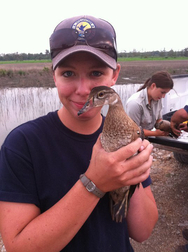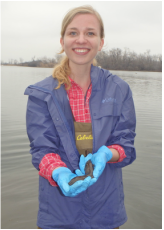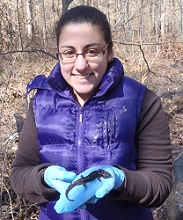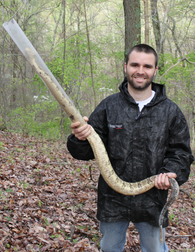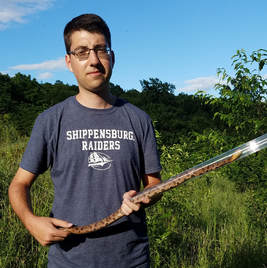
Jason Dallas, Ph.D. Candidate
Jason completed his M.S. at Shippensburg University researching the ecology of Northern Black Racers (Coluber constrictor constrictor) and their effects on syntopic snake species. For this PhD, Jason is currently working with the Missouri Department of Conservation on determining the prevalence of Ranavirus in amphibian communities at multiple fish hatchery sites. Additionally, he plans to examine the gut microbiota and fatty acid profiles of embryonic and hatchling Eastern Fence Lizards (Sceloporus undulatus) from two distinct habitats in Arkansas.
Jason completed his M.S. at Shippensburg University researching the ecology of Northern Black Racers (Coluber constrictor constrictor) and their effects on syntopic snake species. For this PhD, Jason is currently working with the Missouri Department of Conservation on determining the prevalence of Ranavirus in amphibian communities at multiple fish hatchery sites. Additionally, he plans to examine the gut microbiota and fatty acid profiles of embryonic and hatchling Eastern Fence Lizards (Sceloporus undulatus) from two distinct habitats in Arkansas.
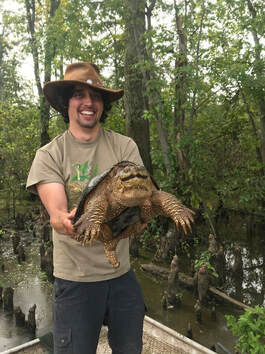
Adrian Macedo, Ph.D. Student
Adrian grew up in the mountains of northern California, and at an early age became fascinated with herpetofauna. He completed a BS in wildlife at Humboldt State University in 2016. During his undergraduate studies, he worked for the California Department of Fish and Wildlife conducitng research on fish and herpetofauna in the Klamath mountains. This was were he conducted his Masters thesis on the life history variation of the Coastal Tailed Frog across an elevational gradient also at HSU. His interests are broad and he considers himself a naturalist, and is interested in both flora/fauna and driving factors of natural phenomena. He is now pursuing a PhD at Southern Illinois University-Carbondale, to study the implications of changing water elevations on the herpetofaunal community of the Cache River State Natural Area. This natural area harbors remnants of the northern most Bald Cypress/Tupelo swamps in north America, a diverse ecosystem supports species including the Common Snapping Turtle (pictured here) and the state protected Bird-voiced Tree Frog.
https://www.inaturalist.org/people/amacedo
https://www.instagram.com/wanderingnaturalist/
Adrian grew up in the mountains of northern California, and at an early age became fascinated with herpetofauna. He completed a BS in wildlife at Humboldt State University in 2016. During his undergraduate studies, he worked for the California Department of Fish and Wildlife conducitng research on fish and herpetofauna in the Klamath mountains. This was were he conducted his Masters thesis on the life history variation of the Coastal Tailed Frog across an elevational gradient also at HSU. His interests are broad and he considers himself a naturalist, and is interested in both flora/fauna and driving factors of natural phenomena. He is now pursuing a PhD at Southern Illinois University-Carbondale, to study the implications of changing water elevations on the herpetofaunal community of the Cache River State Natural Area. This natural area harbors remnants of the northern most Bald Cypress/Tupelo swamps in north America, a diverse ecosystem supports species including the Common Snapping Turtle (pictured here) and the state protected Bird-voiced Tree Frog.
https://www.inaturalist.org/people/amacedo
https://www.instagram.com/wanderingnaturalist/
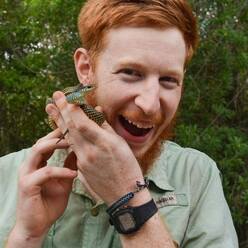
Jake Hutton, Ph.D. Student
Jake received his M.S. while in the Steve Price Herpetology Lab at the University of Kentucky where he examined how mountaintop removal mining affected stream salamander abundance, occupancy, and diet composition. For part of his PhD, Jake is monitoring the influence of seasonal water regimes on reptile and amphibian breeding phenology, distribution, abundance, and community structure in the Buttonland Swamp of the Lower Cache River Valley in Southern Illinois. In his free time, Jake enjoys cooking, photography, painting, and feeding his praying mantis.
Jake received his M.S. while in the Steve Price Herpetology Lab at the University of Kentucky where he examined how mountaintop removal mining affected stream salamander abundance, occupancy, and diet composition. For part of his PhD, Jake is monitoring the influence of seasonal water regimes on reptile and amphibian breeding phenology, distribution, abundance, and community structure in the Buttonland Swamp of the Lower Cache River Valley in Southern Illinois. In his free time, Jake enjoys cooking, photography, painting, and feeding his praying mantis.
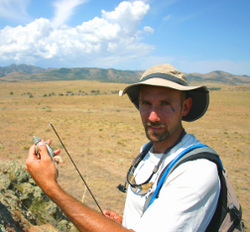
Robin Warne, PI
Associate Professor, School of Biological Sciences, Zoology Program & Biology Program, Southern Illinois University
Biological Sciences Program Coordinator
Director for the Middle Mississippi River Wetland Field Station (MMRWFS) & Center for Ecology
Research: I'm a physiological ecologist who enjoys wrangling everything from frogs and lizards to birds and mammals. My research focus is on linking the interacting ecological factors and organismal systems that determine homeostasis, developmental plasticity, and disease processes. In amphibians, I use experimental approaches to understand how gut microbiomes interact with neuroendocrine systems to regulate development, physiological performance, and ranavirus disease dynamics. I also explore the evolutionary ecology of life history trade-offs in lizards, amphibians, and insects. Furthermore, I seek to link homeostatic physiology and behavior influence rodent and lizard ecological communities in desert grasslands.
Associate Professor, School of Biological Sciences, Zoology Program & Biology Program, Southern Illinois University
Biological Sciences Program Coordinator
Director for the Middle Mississippi River Wetland Field Station (MMRWFS) & Center for Ecology
Research: I'm a physiological ecologist who enjoys wrangling everything from frogs and lizards to birds and mammals. My research focus is on linking the interacting ecological factors and organismal systems that determine homeostasis, developmental plasticity, and disease processes. In amphibians, I use experimental approaches to understand how gut microbiomes interact with neuroendocrine systems to regulate development, physiological performance, and ranavirus disease dynamics. I also explore the evolutionary ecology of life history trade-offs in lizards, amphibians, and insects. Furthermore, I seek to link homeostatic physiology and behavior influence rodent and lizard ecological communities in desert grasslands.
Lab Alumni
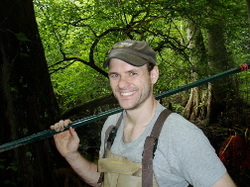
Lucas Kirschman, Ph.D.
Graduated 2017 Lucas is now an Assistant Professor of Biology at Southeast Missouri State University. He joined the Warne Lab in January 2012. His dissertation explored how physiological stress and disease interact to shape resource allocation and critical disease windows in larval amphibians. 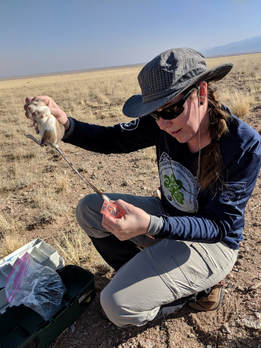
Nikki Walker, M.S. Student
Nikki studied rodent physiological function in the Chihuahuan desert ecosystem of central New Mexico. When she’s not chasing kangaroo rats, she enjoys hiking, camping, and fishing with her husband and two dogs. She received her BS in Wildlife Biology from Colorado State University in 2013 and is looking forward to returning to her studies after a 5 year hiatus spent working at the USDA National Wildlife Research Center. 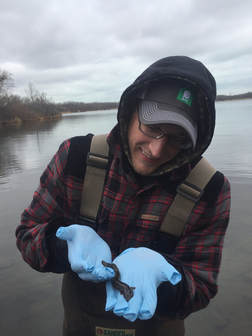
Jared Bilak, Ph.D. Student in the labs of Dr. Whiles and Dr. Warne
Jared was funded by the Shedd's Daniel P. Haerther Center for Conservation and Research. He studied the natural history of common mudpuppies (Necturus maculosus), large aquatic salamanders native to the Great Lakes region. He examined seasonal movements, assessing population and home range sizes, and determining what causes mudpuppies to be most active in the coldest months of the year. He completed his M.S. in Environmental Biology at Clarion University of Pennsylvania under the advisement of Dr. Kurt Regester. His Master’s research assessed the prevalence of Batrachochytrium dendrobatidis (Bd) and Ranavirus among eastern hellbender (Cryptobranchus a. alleganiensis) populations in four Western Pennsylvania streams. |
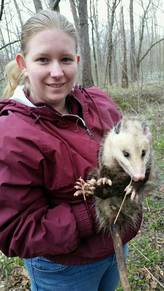
Katy Banning, B.S.
Graduated 2017 Katy is currently an AmeriCorps Member at Cypress Creek National Wildlife Refuge. She worked in the Warne Lab as an undergraduate researcher for 3 years (2014-17). She primarily conducted research on amphibian disease ecology and physiology focusing on Ranavirus and larval amphibian immune and metabolic response to infection. 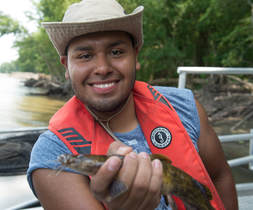
Daniel Morales, Undergraduate Researcher
Daniel is from the northwest suburbs of Chicago, and came down to SIUC to major in Zoology. He is a McNair's Scholar and has worked in the Warne Lab for 2 years (2015-17) as an undergrad research associate. He is pursuing a MS degree at the University of Nebraska-Lincoln. 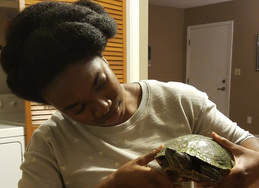
Ayana Scott-Elliston, MS Student
Ayana studied the role of the gut microbiome on larval amphibian developmental physiology. She loves volunteering at museums and spending time with her border collie mix, Colby. She completed her M.S. in Microbiology & Immunology at Virginia Commonwealth University under the advisement of Dr. Peter Uetz. Her M.S. research focused on elucidating phenotypes and functions of uncharacterized proteins using Streptococcus sanguinis SK36 to further the annotation of these prominent yet unstudied proteins and protein families. |
|
Savhannah Haslett
Savhannah has been working as an undergraduate researcher in our lab since the start of her studies at SIUC. She is a Saluki Research Rookie (2012), Saluki Scholars Research Opportunity (2012-13) awardee, and a REACH scholar (2014). She has or is working on stress in migrating Saw-whet owls, stress effects on stoichiometry of frogs, and the physiological mechanisms of ranavirus infiltration in tadpoles. |
Sandra Ehnert
Sandra has been conducting her undergraduate research in our lab for the past 2 years. Her focus and passion is informal STEM learning, which she had the great opportunity to develop further as an intern at the St Louis Zoo. |
